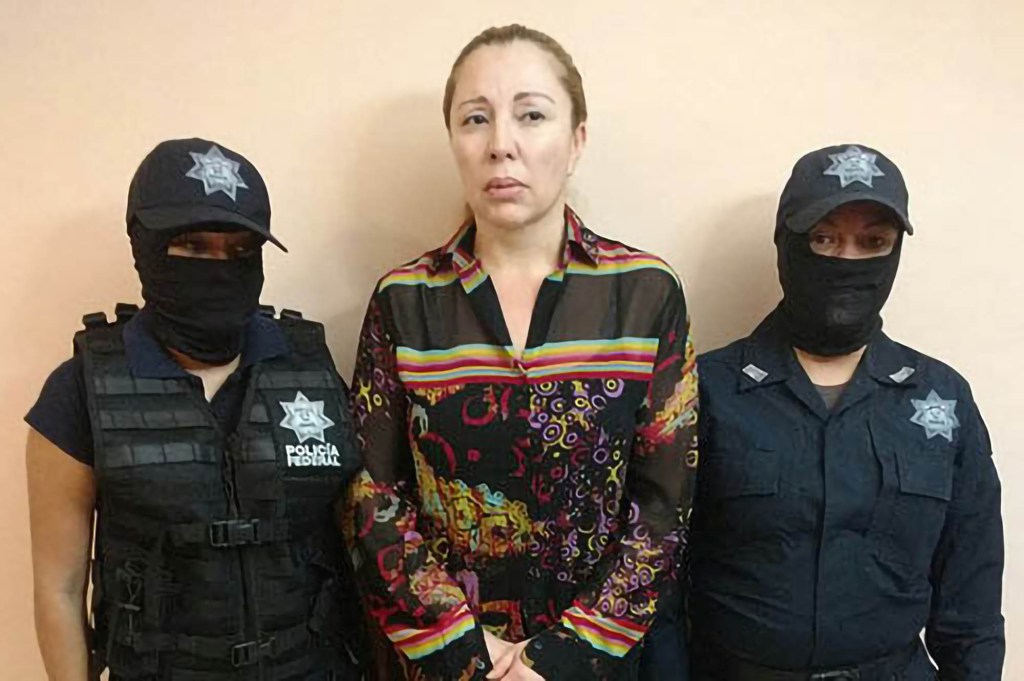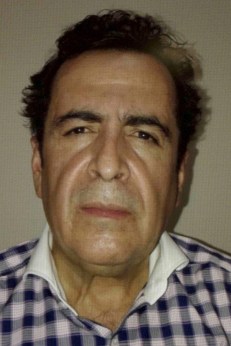Shaktiman
Admiral
★★
- Joined
- May 24, 2022
- Posts
- 2,696

Meet the queens at the top of Mexico’s most ruthless drug cartels
Meet the glamorous, shocking and dangerous women running Mexico’s most powerful drug syndicates.
Meet the queens at the top of Mexico’s most ruthless drug cartels
ByIsabel Vincent
June 26, 2021 8:22am
Updated

MORE ON:DRUG CARTELS
US consulate staff ordered to ‘shelter in place’ as drug violence rages in Mexican border town
Migrant smugglers promoting easy border crossings on social media during crisis
Father of murdered Mexican cartel victim says charred remains don’t belong to students: ‘Not our children’
DeSantis vows to leave cartel members ‘stone cold dead’ if they try to cross border
They’re also as brutal and ruthless as any of their male counterparts, capable of launching all-out war against their enemies.
“The cartels used to be a men’s-only game, and women were kept around for parties,” security consultant Robert Almonte, an expert on Mexican cartels who trains law enforcement, told The Post.
Now, women have emerged as a powerful force in one of the world’s largest criminal enterprises, working in all aspects of the cartels, including as female “hitmen” or sicarios.
“The cartels like to use pretty girls as hitmen to lure their victims,” Almonte said. “And some of them are in important leadership positions.”
Here are four of the most high-ranking Cartel Queens. After two high-profile busts, these drug doyennes are being tried like their male counterparts — and possibly turning against them …

Emma Coronel Aispuro: Mrs. El Chapo
On June 10, Emma Coronel Aispuro, a former beauty queen, pleaded guilty in federal court in Washington, DC, to helping Joaquin “El Chapo” Guzmán — her notorious trafficker husband — run his empire, the Sinaloa cartel. The 31-year-old also admitted to aiding Guzmán, now serving a life sentence in a Colorado prison, escape from a high-security jail in Mexico in 2015.The California native met her husband at a party thrown by her Mexican-born drug-trafficking father in 2006 when she was 17. A year later, she was crowned Miss Coffee and Guava in Canelas, a town in northwestern Mexico.
The couple announced their plans to marry in the run-up to the pageant, and many have suggested that she won the title because of El Chapo’s influence. Since she appeared at her coronation in a diamond-encrusted crown, El Chapo dubbed her his “little queen.” El Chapo proposed to the beauty queen at the contest, flanked by 100 of his hitmen. They were married on her 18th birthday — July 3, 2007. El Chapo was 50 years old at the time of the ceremony.

The nickname stuck, and she has been known as “La Reinita” to her husband’s cartel cohort ever since. In 2011, she gave birth to the couple’s twins — Maria and Emali. Three years later, El Chapo, by then one of the world’s biggest drug lords, was arrested by Mexican authorities for running his drug empire. Coronel Aispuro helped her husband distribute cocaine and passed on messages to the cartel while he was imprisoned in Mexico, according to the FBI. She was also a constant presence at his trial in federal court in Brooklyn, which began in November 2018 and ended in February 2019.
Almonte believes that Coronel Aispuro likely gave up intelligence about the Sinaloa cartel in exchange for more lenient treatment. “Likely, she will need to go into witness protection,” said Almonte. She will likely serve a short sentence if she spills information about the cartel, and if that happens, her life will be in danger once she is released, he said.

Jessica Oseguera: ‘La Negra’
A day after Coronel Aispuro’s court appearance, Jessica Oseguera, the 34-year-old daughter of El Chapo’s rival cartel boss, Nemesio Oseguera Cervantes, was sentenced to two and a half years in prison.She was found guilty of helping her dad launder money through various businesses — sushi restaurants, a resort and a tequila company — according to a Department of Justice press statement.

Oseguera’s father, known by his underworld moniker “El Mencho,” heads up the Jalisco New Generation Cartel. One of Mexico’s most brutal drug trafficking rings, its members are known for beheading enemies and dissolving their bodies in acid. El Mencho commands a group of 5,000 hitmen and is on the Drug Enforcement Administration’s list of most wanted traffickers. The reward for information leading to his capture is $10 million.
Oseguera, who has both Mexican and US citizenship, was arrested last year when she drove across the border.
According to Almonte, her “extremely lenient sentence” of two and a half years likely means that she surely gave up information about her fugitive father, El Mencho.
“La Negra,” as Oseguera is known, has two young children and is said to be desperate to be reunited with them. Although she had initially insisted she was not involved in her father’s drug business, she expressed remorse in a letter to the judge.
“I ask for forgiveness, and say, without hesitation, that I regret everything I did that may have caused any harm,” Oseguera wrote. “Today, more than ever, it is clear to me that I should have paid more attention to my actions and my actions’ consequences.”

Clara Elena Laborín: ‘La Señora’
In 2016, authorities arrested Clara Elena Laborín, a former beauty queen from Sonora state who had married Héctor Beltrán Leyva, El Chapo’s former partner in the Sinaloa cartel. Laborín is known as “La Señora” or “The Missus” because her husband treated her like a trophy bride.In 2008, Beltrán Leyva broke with El Chapo and formed his own cartel after his brother and business partner, Alfredo, was arrested by Mexican authorities. Beltrán Leyva suspected that El Chapo had snitched on his sibling to authorities, so he launched a bloody war against the Sinaloa cartel.

Laborín was enlisted to direct the money-laundering component of her husband’s Beltrán Leyva Cartel. In 2010, she was kidnapped by a rival group and photographed in captivity, blindfolded and with her feet and hands bound, with automatic rifles pointed at her. After 13 days, she was released and returned to manage the cartel’s finances.
Four years later, when her husband was arrested, Laborín became the head of the cartel, launching one of the bloodiest waves of violence in Acapulco. Hers was a brutal campaign for dominance that turned the resort city into Mexico’s murder capital. Tourists were caught in the crossfire and forced to step over bullet-riddled bodies on beaches as the Beltrán Leyva Cartel fought their rivals in the Independent Cartel of Acapulco.
Laborín said she is no longer part of the cartel.
“Women in the cartels have shown that they can be as brutal as some of the men,” Almonte said.

Sandra Ávila Beltrán: ‘Queen of the Pacific’
The most legendary of the drug empresses is Sandra Ávila Beltrán, who was so respected among cartels that she is known as “Queen of the Pacific” and had a popular “narcocorrido” song written about her by the band Los Tigres del Norte in 2004. “The more beautiful the rose, the sharper the thorns,” goes one lyric.She is also the inspiration for the Mexican telenovela “La Reina del Sur” (“Queen of the South”). Ávila Beltrán earned her moniker by commandeering a fleet of tuna boats — each loaded with 10 tons of cocaine — that sailed from the port of Manzanillo to California in 2001. Authorities seized some of the cargo, and Ávila Beltrán went underground.
Now 60, Ávila Beltrán was an important link between Mexican cartels and Colombian cocaine traffickers, largely because of her romantic relationship with Colombian drug dealer Juan “The Tiger” Diego Espinoza.
A third-generation drug trafficker born in Baja California, Mexico, Ávila Beltrán is connected by family ties to powerful kingpins including the Guadalajara Cartel’s Rafael Caro Quintero and has had affairs with several capos. She also married two law-enforcement officers who joined the cartels.
Her first husband was killed in a shootout, her second was stabbed through the heart — both during the Mexican drug wars.

Ávila Beltrán herself is a sharp shooter who, during her heyday, thought nothing of carrying suitcases stuffed with millions of dollars in $100 bills.
In addition to her preferred tight jeans and stilettos, the raven-haired Ávila Beltrán was known for wearing a gold pendant of King Tutankhamen, studded with 83 rubies, 228 diamonds and 189 sapphires. All the while, she repeatedly insisted that she was nothing more than a wealthy homemaker in Guadalajara, making a living by renting out properties and selling clothes.
She came onto police radar in 2002 after paying $5 million in ransom when her teenage son was kidnapped by rival drug traffickers. Police wondered where this humble homemaker got the cash, and Ávila Beltrán — who owned more than 200 properties in Guadalajara — was arrested five years later. She was charged with helping her Colombian boyfriend sell drugs and launder money through a string of tanning salons she owned called Electric Beach.
At her arrest in the fall of 2007, 30 Mexican federal agents swarmed an upscale Mexico City diner where she was sipping coffee. Before they led her away, she convinced them to allow her to touch up her makeup so that she could look good in her mugshot. In the arrest video she can be seen flicking back her hair and smiling for the camera.
Even after Ávila Beltrán pleaded guilty — eventually admitting to US authorities that she helped her Colombian boyfriend sell drugs — she found the spotlight hard to resist. As she told the judge at one of her first hearings in Mexico: “It’s nice to be called a queen.”
At the Santa Martha Acatitla Women’s Prison, she ordered Thai food from an upscale restaurant in Mexico City and organized Botox injections. When authorities cracked down on her take-out meals, Ávila Beltrán filed a complaint with the human rights commission. She lost her appeal, and two high-ranking prison employees were fired, according to Mexican news reports.
After serving time in both Mexican and US prisons, she was released in 2015, and currently lives “quietly” in Guadalajara.





